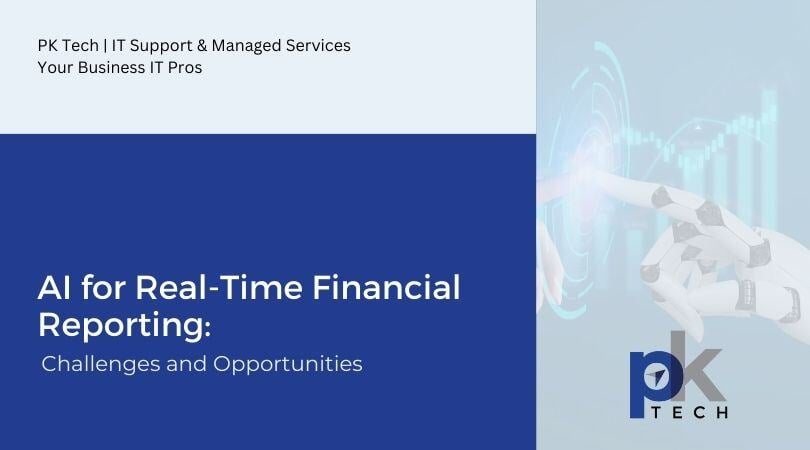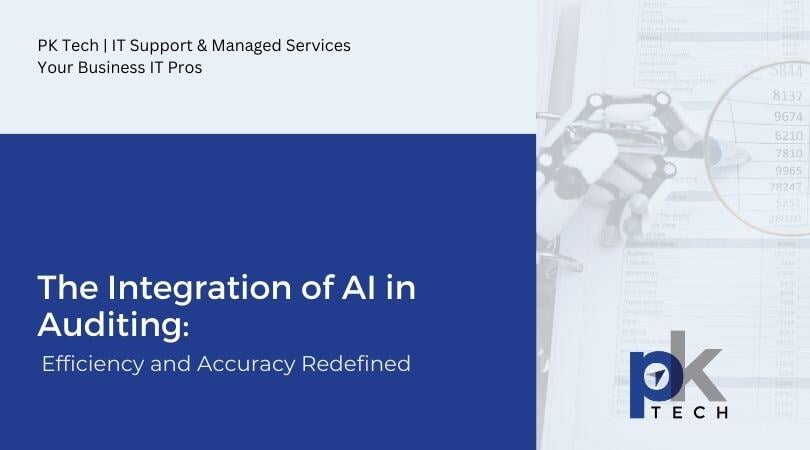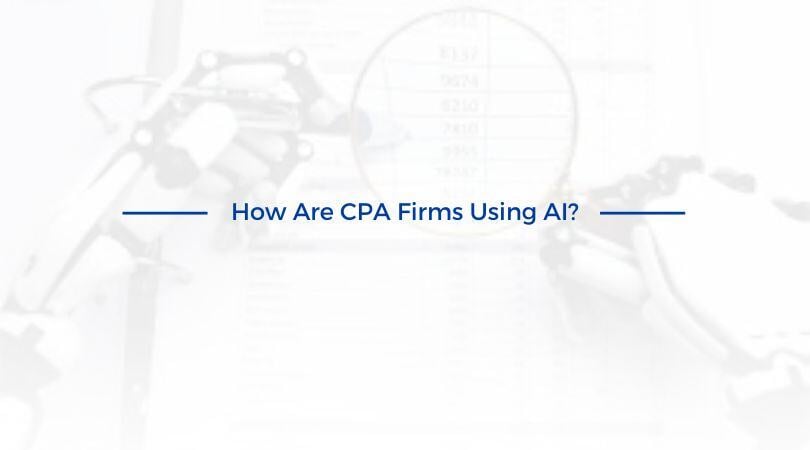Safeguarding Financial Integrity: The CPAs Role in Managing Cybersecurity Threats
For the professionals whose lives revolve around April 15th, there is a world of risk and opportunity. The landscape of financial management–with...
5 min read
PK Tech December 9, 2024

Technology has long since been paving a new way forward. From ordering a hamburger at a fast food joint to managing books for a corporation, Artificial Intelligence (AI) is, quite literally, taking over. Financial reporting is no exception.
Businesses of all sizes are leveraging AI to gain real-time insights into their financial health – enabling faster, more informed decision-making. With these innovations come challenges as well.
This blog will explore the opportunities AI presents in real-time financial reporting, the hurdles organizations face in implementing it, and the steps they can take to maximize its potential.
Traditionally, financial reporting was a time-consuming process, often conducted quarterly or annually. This lag in reporting could leave companies scrambling to make decisions based on outdated information. Now, the demand for more timely insights has led to a shift toward real-time financial reporting, where companies can access up-to-date financial data almost instantaneously.
Real-time reporting allows businesses to:
AI and machine learning (ML) algorithms can automatically process large volumes of financial data from various sources, analyze trends, and generate reports with minimal human intervention. This has the potential to revolutionize the way organizations approach financial decision-making, especially in fast-paced industries where timing is critical.
AI has an almost endless list of applications in the world of business and beyond. For the purposes of this blog, we’re going to hone in on the opportunities to leverage AI and ML for managing real-time financial reporting. Here are the top five ways AI can enhance existing processes for financial reporting:
AI can drastically reduce the time and labor required for financial data entry and reconciliation. Machine learning models can extract data from invoices, receipts, bank statements, and other financial documents with a high degree of accuracy. These systems can also flag discrepancies or errors in the data, reducing the need for manual oversight.
By automating routine tasks, organizations can save time and resources, allowing financial professionals to focus on more strategic activities such as analysis and forecasting.
AI’s ability to analyze historical data and identify patterns enables more sophisticated predictive analytics. With real-time financial data at their fingertips, organizations can generate forecasts and predict future financial performance with greater accuracy.
For example, AI can predict cash flow trends based on seasonal fluctuations, market conditions, or internal operational changes. This allows companies to proactively manage their financial resources, avoid liquidity issues, and optimize investments.
AI can enhance financial forecasting by incorporating both quantitative data (like revenue and expenses) and qualitative data (such as market sentiment or customer behavior). This enables businesses to generate more reliable forecasts that reflect not just historical trends but also emerging patterns in the market.
Real-time forecasting tools powered by AI can also help companies adjust their forecasts on the fly as new data comes in, offering a level of agility that traditional methods simply can’t match.
AI can enhance risk management by providing real-time insights into potential financial risks. By monitoring key performance indicators (KPIs) and analyzing market data, AI systems can flag potential risks such as cash flow shortages, rising costs, or changes in market conditions.
In industries where regulations and compliance requirements are constantly evolving, AI can also assist in monitoring adherence to regulations and flagging potential compliance issues in real-time, helping businesses mitigate financial risks and avoid costly penalties.
With AI-powered analytics, finance teams can access real-time insights that guide strategic decision-making. Whether it’s assessing the ROI of a new project, determining the financial impact of a business acquisition, or evaluating cost-saving opportunities, AI helps organizations make data-driven decisions faster and more effectively.
Decision-makers can visualize financial trends, analyze multiple scenarios, and adjust strategies as needed, which is particularly valuable in a fast-paced business environment.
While the potential benefits of AI in financial reporting are clear, organizations face several challenges when implementing AI-based systems. Here are five key hurdles to be aware of before implementation:
AI systems rely heavily on high-quality, structured data to produce accurate and meaningful insights. In many organizations, financial data is stored in disparate systems — such as accounting software, ERP platforms, and spreadsheets—that are not always compatible or synchronized.
Integrating these different data sources into a unified AI-driven platform can be a complex and resource-intensive process. Inaccurate, incomplete, or inconsistent data can lead to unreliable reports and undermine the effectiveness of AI models.
The financial industry is heavily regulated, and companies must ensure that their AI systems comply with laws and regulations regarding data privacy, financial reporting standards, and anti-money laundering (AML) measures. In some regions, strict regulatory frameworks make it challenging to deploy AI solutions that handle sensitive financial data.
For instance, companies must ensure that AI tools do not inadvertently introduce biases or make decisions that could lead to non-compliance. Maintaining transparency and clarity in AI models is also critical, especially in sectors where accountability is paramount.
Implementing AI in financial reporting requires a specialized set of skills, including expertise in machine learning, data engineering, and finance. Many organizations struggle to recruit and retain professionals with the technical expertise required to design, implement, and maintain AI systems.
Furthermore, existing finance teams may need additional training to use AI tools and interpret the results they generate effectively. Bridging these skill gaps can be time-consuming and costly, particularly for smaller businesses with limited resources.
Adopting AI technologies often requires significant upfront investment in software, hardware, and personnel. While the long-term benefits of AI are clear, the initial costs can be a barrier for many organizations, particularly small and medium-sized enterprises (SMEs).
Additionally, ongoing costs associated with maintaining AI systems and keeping them up to date can add up over time. Organizations must carefully evaluate the return on investment (ROI) and determine whether the benefits of real-time financial reporting justify the costs.
As organizations rely more on AI systems for financial reporting, they also become more vulnerable to cybersecurity risks. AI systems can be targeted by malicious actors seeking to steal sensitive financial data or manipulate reports.
Ensuring robust data security measures — such as encryption, access controls, and real-time monitoring — is crucial when implementing AI in financial reporting. Businesses must also comply with data protection regulations like the General Data Protection Regulation (GDPR) to protect customer and employee data.
AI has the potential to transform financial reporting, moving organizations toward real-time, data-driven decision-making that can lead to better financial outcomes. The ability to automate processes, predict financial trends, and enhance risk management provides significant competitive advantages for organizations that achieve successful implementation.
While challenges should be considered, businesses can successfully integrate AI into financial reporting by investing in data infrastructure, fostering cross-functional collaboration between finance and IT teams, and ensuring appropriate security and compliance measures are in place.
As AI technology continues to mature, the opportunities for real-time financial reporting will only expand, allowing organizations to make smarter, more agile financial decisions that drive growth and innovation. It’s true: the future of finance will be powered by AI.
As a managed IT service provider, PK Tech is proud to offer 15 years of experience with a focus on the financial sector. We boast AICPAs SOC 2 Type II attestation, proving via third-party audit by an independent firm that we passed a rigorous and comprehensive assessment of our security and privacy controls. Schedule a time to chat with our team here.

For the professionals whose lives revolve around April 15th, there is a world of risk and opportunity. The landscape of financial management–with...

Artificial intelligence (AI) has been making waves across industries, and the field of auditing is no exception. Traditionally seen as a...

Artificial intelligence (AI) is changing the world as we know it, and the realm of accounting is no exception.